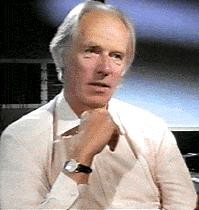|
 |
 |
 |
|
George
Martin |
Before
the Beatles George Martin's Parlophone Label had been called the
"eccentric arm" of EMI, which obtained an erroneous reputation
for comedy records which were primarily songs as opposed to comedy
routines. That list includes: Peter Sellers, Spike Milligan - both from
the Goons; Beyond the Fringe (which included Peter Cook and Dudley
Moore); Flanders & Swann; Peter Ustinov; Bernard Cribbins; Lance
Percival. There were other artists he produced whose work was not easily
categorised ranging from Cleo Laine, to Johnny Dankworth, Ron Goodwin,
to Humphrey Lyttleton, etc. It was not a shifter of huge amounts of 45's
on a regular basis, although The Temperence Seven showed the way by
earning the label its first no.1 in 1961 with "You're Driving Me
Crazy", albeit a retro-twenties tune.
EMI's loss of RCA's American catalogue (released on HMV) which included many early Elvis classics and Columbia also losing their American connections probably halped prompt Martin into taking a chance with "Pop" artists and groups in an attempt to expand the labels artist base. Apart from Shane Fenton and the Fentones, Martin's more mainstream pre-Beatles
recordings included skiffle with The Vipers, not forgetting that Parlophone also featured the
heavy-selling Adam Faith, although produced by John Burgess. Like many of his A&R (Arranging and
Repertoire) contemporaries cared about the technical production where sesion musicians were often drafted in to play the required notes correctly in as few "takes" as possible - studio time was fixed in those days and many
more records failed than actually reached the charts.
The classically-trained Martin was not totally au fait with American rock 'n' roll (this was sometimes passed over to Ron Richards) although this may have played to his advantage. His productions are generally clean and clear, allowing some of the artists personality to come through. Again, this is especially noticeable in the case of the Fab Four where their sound was less derivative of the classic American sound and managing to sound fresh, even today. They may well have met their match faced with somebody like eccentric producer Joe Meek whose "wall of sound" may well have stamped out too much individuality. He also contributed very creditable piano figures on many tracks, adding an extra dimension.
After signing the Beatles and the ensuing tide of Merseybeat had swept away all before it Sir George's
productions included Billy J. Kramer, Cilla Black and Gerry and the Pacemakers though the latter were released on Columbia to take the strain off Parlophone's hectic release schedule. well before they ran amok with studio time and ideas. Yet having made more than a few Pounds profit and EMI basking in the Beat Boom, the latter seemed to think so little of George Martin's contribution to the Beatles success that he formed the
independent
AIR operation with some of his equally dis-satisfied colleagues in 1965. It was a wake-up call to EMI who realised that to now
separate their all-conquering, multi-million selling Mop Tops from their invaluable producer was unthinkable; the move was to have important implications for the record industry as a whole with more relaxed recording hours and more to suit.
After the Beatles had split in 1970 George Martin continued to produce for a variety of artists and the Parlophone label was absorbed along with Columbia and HMV into one homogenous EMI one size fits all label. Parlophone
was revived as a label in later years reflecting the influence the name still has
both within the minds of the industry and the record (or CD) buying
public at large. |
 |



